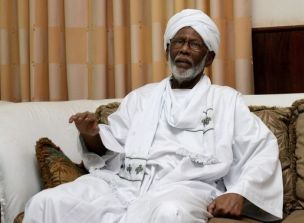Al-Turabi denies role in attempt to kill Egypt president, hints at Taha’s involvement
January 1, 2011 (NAIROBI) – The former senior member of Sudan’s ruling party turned-opposition leader, Hassan Al-Turabi, has claimed he had nothing to do with the 1995’s attempt to assassinate Egypt’s president Husni Mubarak, saying that the masterminds of the attempt are “deeply entrenched” in the Sudanese government.

Sudan’s relations with its northern neighbor reached its nadir in 1995 when gunmen allegedly backed by Sudan opened fire on Mubarak’s armored limousine near the airport in Ethiopia’s capital Addis Ababa. President Mubarak survived the well-planned attack and returned to Egypt immediately afterwards.
The attempt almost triggered a full-blown war between the two countries. Egyptian officials pointed the finger at Al-Turabi, along with his once closest aide Vice-President Ali Osman Mohamed Taha, for planning the attempt.
Al-Turabi was the leader and ideologue of the National Islamic Front (NIF), an offshoot of the Egypt-based Muslim Brotherhood, which in 1989 orchestrated the coup that brought president Al-Bashir to power and toppled the government of former Prime Minister Al-Sadiq al-Mahdi.
The veteran Islamist was believed to be the de-facto ruler of the country until he fell out with president Al-Bashir in 1999 as he attempted to seize full power and sideline president Al-Bashir, he was subsequently sent to prison on accusations of conspiracy until he was released in 2003.
Vice-president Taha, who was previously cited as Al-Turabi’s “closest disciple”, conspired with other Islamists to support Al-Bashir in his power struggle with Al-Turabi.
Ever since he was ousted, Al-Turabi became vociferous in opposition to Al-Bashir’s National Congress Party (NCP), from which he split to form the Popular Congress Party.
According to Al-Turabi, “the real culprits [behind the attempt] are people deeply entrenched in power.” Al-Turabi further claimed that the Islamic group which executed the attempt had received the support to do so from behind his back and that of president Al-Bashir.
“Egyptian officials are well aware of the truth and know who I am referring to,” he added, in what appears to be a veiled reference to Vice-President Taha.
Al-Turabi further claimed that the Americans had told him that they know the people really involved in planning the attempt.
Separately, Al-Turabi has castigated the US government for what he described as forcing Al-Qaidah leader Osama Bin Laden to adopt Jihadist ideologies.
According to Al-Turabi, Osama Bin Laden had no intention to wage Jihad against the Americans when he was living in Sudan, adding that it was the US government which antagonized him after it forced the Saudis to strip him of citizenship and Sudan to expel him.
In its early days under the disguised leadership of Al-Turabi, the Sudanese government gave sanctuary to Osama Bin Laden in the 1990s, at the zenith of its ideological sympathies with trans-national Islamists.
However, after the ousting of Al-Turabi, the Sudanese government shifted shape and cooperated with the CIA in expelling the Al-Qaidah leader. Osama Bin Laden is the primary suspect for planning the 9/11 attack in the US.
(ST)
